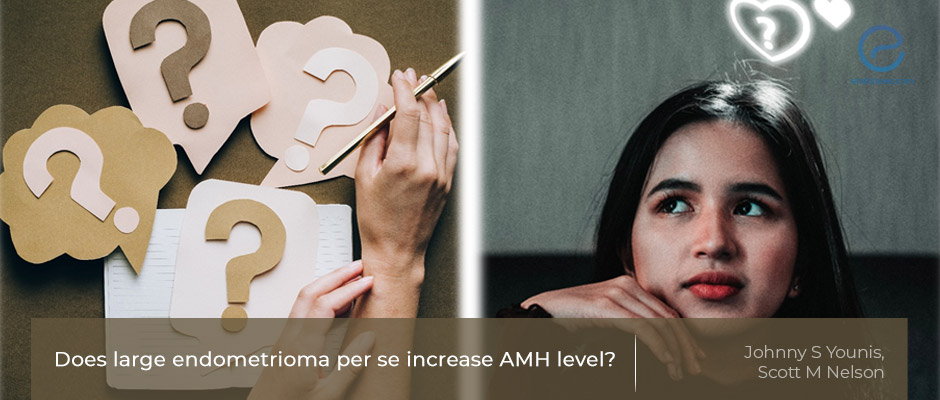The influence of endometrioma and surgery on ovarian reserve
Apr 5, 2021
Relationship between preoperative endometrioma volume and AMH levels
Key Points
Highlight:
- Contrary to the current view, recent two studies suggest a positive dose-response relationship between the volume of preoperative endometrioma and high Anti Mullerian Hormone (AMH) levels.
Importance:
- Women with endometriosis and endometrioma, when having subfertility, present considerable difficulty for ovarian reserve assessment.
- The presence of endometrioma and the effect of ovarian surgery on ovarian reserve versus the competence of biomarkers for evaluation such as AMH and follicle count, make it more problematic.
Key points:
- This commentary by Dr. Younis (Israel) and Dr. Nelson(UK), recently published in the journal RBMO.
- It is known that the reduction of serum AMH level is associated with endometrioma by destroying normal ovarian tissue.
- Surgical removal of ovarian tissue in patients with endometrioma also reduces ovarian reserve and AMH levels.
- According to recent two observational, retrospective, cross-sectional studies, the AMH levels increased in women with endometrioma measuring more than 6-7cm.
- One possible mechanism for increased AMH levels might be localized inflammation and neo-angiogenesis.
- Another explanation is that endometriomas cause primordial follicles to exit from a dormant state and enter an AMH-producing stage of follicular development.
- Lastly, a methodological selection bias also might affect this result.
- Studies showing that large endometrioma causing high AMH levels have been limited and should be interpreted with caution.
Lay Summary
Women with endometriosis and endometrioma, often have subfertility. These patients present considerable problems for the evaluation of ovarian reserve. One of the well-known ovarian reserve biomarkers is anti-Müllerian hormone (AMH) levels.
So far, it was known that the reduction of serum AMH level is associated with endometrioma, which destroys the normal ovarian tissue. Also, surgical removal of endometrioma was thought to reduce ovarian reserve and AMH levels.
Contrary to this view, several recent studies present opposite results. To understand their interrelationship between endometriosis, endometrioma, and AMH level, Dr. Nelson group from the UK introduce a commentary with different point of views. This commentary paper is recently published in the journal “Reproductive biomedicine online”.
According to two recent papers, AMH level was increased in women with endometrioma measuring more than 6-7cm. One of the papers shows a weak positive dose-response relationship between the volume of preoperative endometrioma and the AMH level.
One possible mechanism is that the cause of increased AMH levels might be the localized inflammation and neo-angiogenesis. Another possible explanation is that endometriomas, being ‘toxic’ to primordial follicles, drove them to exit their dormant state and enter the later AMH-producing stages of follicular development. Lastly, a methodological selection bias might affect the result. Both studies originated from gynecological surgery departments to whom women with a good ovarian reserve may have been referred and, therefore, women with infertility, low serum AMH levels, or both, may have been underestimated.
Although the exact role of AMH in the growth and maintenance of endometriosis is not fully elucidated, endometrium and endometriotic tissue may be a target of AMH for inhibitory actions.
"Available studies showing that large endometrioma causes high AMH levels have been limited and should be interpreted with caution, particularly given their retrospective nature, wide inclusion criteria, cross-sectional nature, and possible selection bias. Because of the significance of the association between AMH levels and endometrioma diameter, and its related wider implications, prospective well-conducted pre-clinical and clinical studies, are urgently required. Until then, the discussion remains open" concluded the authors.
Research Source: https://pubmed.ncbi.nlm.nih.gov/33583699/
Anti-Müllerian hormone Endometrioma Endometriosis Endometriotic cystectomy Ovarian Reserve

